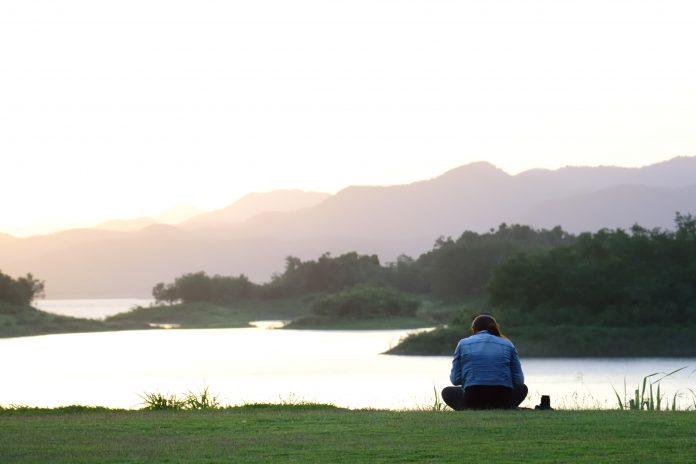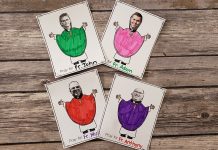
by Leland D. Nagel
BBBBRRRRIIINNNGGGG!
It was ear piercing and it would not stop. I had to put my hands over my ears. Boy was it loud—a continuous blast of noise that shook me to the core. It just kept blaring while every adolescent bone in my body screamed “Run! Hide!! Get out of here, NOW!” All I wanted was to be free of that ear-splitting noise, to find a safe harbor. I wanted someone to come and turn it off.
Fight or flight. This, we are taught, is our primitive and automatic response whenever perceiving an attack or threat. It is activated when we come under excessive stress or verbal assaults—or when we set off a building’s alarm. I did this once in college, when I wasn’t paying attention. I exited through one of those alarm-activated doors. True to the psychology I was being taught, I ran and hid as fast as I could. It was a primal reaction.
Well, it recently happened again. With reckless abandon, I opened the door—despite the fact that there is a sign clearly posted above the door that reads “Do not exit through these doors between 11:00 p.m. and 6:00 a.m. An alarm will go off” (a sign I had never seen). Then it happened, just as I described above. I wanted to flee rather than face my mistake: Just run and hide and all would be well.
The Value of Retreat
Ironically, I don’t believe running away is always bad. In fact, a well-developed spiritual life demands that we retreat in order to sort out the confusions, the messiness of life, the noises that blare perplexing, nonstop messages. Sometimes we have to face ourselves, confront our inconsistencies, and mend our wounds.
To do this, some of Jesus’ disciples went to the mountaintop and didn’t want to come down. Some sought safe havens by hiding and denying the One who loved them before they were even in their mothers’ wombs. One took his life in despair; another was forced to seek solace in the upper room where he ultimately was forgiven and became a true disciple.
The One we desire to know best fled to the desert and spent 40 days there. When he returned to the world he left, he was confronted by false promises, half truths, and the same temptations that confront us to this day: to satisfy my own needs (me first); to be popular (appearance over substance); to be powerful (I don’t need God, I did it myself). But Jesus would have none of it. His words and actions were inseparable. He not only walked the talk; he set forth to do the truth.
Where Is the Oasis?
Most people practice the art of flight on a regular basis, but they do it half-heartedly and with the intention to escape rather than to be refreshed and strengthened. It appears that professed believers and parishes are no better. Diocesan retreat centers are closing for lack of revenue; spiritual directors have available time; and parish missions have decreased to one-day events or two nights and a Sunday homily.
Where is the oasis? Where is the place or period of time that provides relief from a troubling or chaotic situation? Where can we find solace to refresh our souls and reaffirm our baptismal commitments?
Young mothers seek sanctuary in bathrooms where they can lock the door. Teens text a mile a minute while sitting amidst their family members, disengaged. Young adults walk to classes, to jobs, wherever, with their heads buried in hand-held screens, oblivious to their surroundings. Some people are mesmerized by a glut of sporting events that never seem to end; others shop. Some keep diaries, write memoirs, or seek asylum in reading books. But computer time (screen time) has surpassed all other forms of asylum.
Personal Idolatry
It would seem many of us desire to be left alone—but not with ourselves. In the cyber world, it’s a 24/7, always-available, forever-on-call mentality. The digital natives ask us digital immigrants, “Why do you turn off your cell phone?” For them and for some of us, it’s a new temptation. Then again, perhaps it’s the oldest temptation: “The moment you eat of it your eyes will be opened and you will be like gods” (Genesis 3:5).
I call it personal idolatry. Are you really that important? Does it make a difference if 254 of your closest friends know “What’s on your mind?” We have left the garden, literally and figuratively. And unless we take the time to be nourished at the oasis, our lives will become a vast wasteland, a desert, a place without living waters. Can you live on “tweets” alone?
Here enters the wisdom of the Church. While Lent is an opportune time, it is not the only time to come to the waters of the oasis. The Church has always invited us to reflect and pray. Jesus would withdraw and go off by himself to pray. In Mark we are told that “Rising very early before dawn, he left and went off to a deserted place, where he prayed” (Mark 1:35). In Isaiah 55, we hear: “All you who are thirsty, come to the water! You who have no money, come, receive grain and eat; Come, without paying and without cost, drink wine and milk! Why spend your money for what is not bread; your wages for what fails to satisfy? Heed me, and you shall eat well, you shall delight in rich fare. Come to me heedfully, listen, that you may have life” (Isaiah 55:1-3).
Listen!
The key is to listen, to shut your mouth, to leave the noise, to step away from your keyboard, to abandon distraction, to “Be still and confess that I am God!” (Psalm 46:11) And if you can’t be still, watch out before you are stopped in your tracks!
If you have ever wandered in the desert of despair, you will know the power of the oasis, the place of water, the source of life. It invites, it beckons, it calls. “Come to me, all you who labor and are burdened, and I will give you rest. Take my yoke upon you and learn from me, for I am meek and humble of heart; and you will find rest for your selves. For my yoke is easy, and my burden light” (Matthew 11:28-30).
Let’s take back the Sabbath. It’s no longer enough to keep it holy. We have to embrace the teaching found in the United States Catholic Catechism for Adults to “Love the Lord’s Day” (see Chapter 27). Let’s renew our covenant with God and be renewed with the source and summit of our faith. Like the Apostles, we are called to devote ourselves “to the communal life, to the breaking of the bread and to the prayers” (Acts 2:42).
Fight the urge to go digital. Instead, come to the feast of bread and wine, of the Body and Blood. Now that’s something truly deserving of a Tweet!
Join NCCL for Catechesis: An Oasis Amidst Diversity, the Professional Development Conference for Catechetical Leaders in Las Vegas, April 18-22. For more information, go to NCCL.us or NCCL.org.
Lee Nagel is the Executive Director of the National Conference for Catechetical Leadership
Copyright 2010, Bayard, Inc. All rights reserved. This article is protected by United States copyright and other intellectual property laws and may not be reproduced, rewritten, distributed, redisseminated, transmitted, displayed, published or broadcast, directly or indirectly, in any medium without the prior written permission of Bayard, Inc.
This article was written by the Catechist Staff and appeared in Catechist magazine, February 2010.
Image Credit: Forest man72/Shutter Stock 659090347




